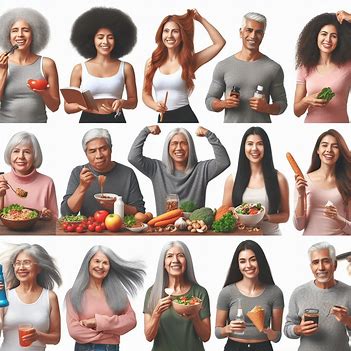Healthy Lifestyle
Preventing gray hair is a common concern

Preventing gray hair is a common concern, especially as graying can be influenced by genetics, age, stress, and lifestyle factors. While the process of graying is primarily determined by genetics, there are several steps you can take to slow it down or prevent premature graying.
Key Factors Leading to Gray Hair:
- Genetics: The most significant factor in determining when your hair will start to gray. If your parents or grandparents grayed early, you may be more likely to experience premature graying.
- Melanin Production: Hair color is determined by the pigment melanin. As we age, melanocytes (cells that produce melanin) decrease, leading to gray or white hair.
- Oxidative Stress: Excessive oxidative stress can damage cells, including melanocytes, speeding up the graying process.
- Vitamin and Mineral Deficiency: Nutritional deficiencies, especially in B-vitamins, iron, copper, and zinc, can contribute to early graying.
- Stress: Chronic stress can lead to oxidative stress and potentially increase the likelihood of gray hair.
- Environmental Factors: Pollution and exposure to toxins may also contribute to oxidative stress, which can affect hair color.
Natural Ways to Slow Down or Prevent Gray Hair:
- Maintain a Nutrient-Rich Diet
- Why it helps: Eating a well-balanced diet rich in vitamins and minerals can help support healthy melanin production and prevent premature graying.
- Key nutrients for hair color:
- Vitamin B12: Deficiency in B12 is strongly linked to premature graying. Include foods like eggs, dairy, fish, and fortified cereals.
- Biotin (Vitamin B7): Found in eggs, nuts, and seeds, biotin supports hair health and color.
- Copper: Copper plays a crucial role in melanin production. Foods rich in copper include shellfish, seeds, nuts, and dark chocolate.
- Zinc: Zinc is important for healthy hair follicles. Foods like chickpeas, spinach, and pumpkin seeds are good sources.
- Iron: Deficiency in iron can lead to hair loss and premature graying. Iron-rich foods include lentils, red meat, spinach, and quinoa.
- Foods to include: Leafy greens, whole grains, fish, eggs, nuts, seeds, and fruits like oranges and berries (rich in vitamin C) help protect against oxidative stress and support melanin production.
- Take Antioxidant-Rich Supplements
- Why it helps: Oxidative stress is linked to premature aging, including gray hair. Antioxidants neutralize free radicals that cause oxidative stress.
- Key antioxidants:
- Vitamin C and E: Both of these vitamins are potent antioxidants that can help protect the melanocytes in your hair follicles.
- Coenzyme Q10 (CoQ10): This antioxidant supports healthy hair and skin and may help reduce signs of aging.
- Catalase: Some supplements include catalase, an enzyme that helps break down hydrogen peroxide in the hair follicle, which can prevent oxidative damage that contributes to graying.
- Reduce Stress
- Why it helps: Stress can contribute to premature graying by increasing oxidative stress and potentially affecting melanocyte function.
- How to manage stress:
- Mindfulness practices: Regular meditation, yoga, and deep breathing exercises can help reduce stress levels.
- Regular exercise: Physical activity helps reduce cortisol levels and combat the negative effects of stress.
- Adequate sleep: Prioritizing restful sleep allows the body to repair and manage stress better.
- Scalp Massage and Hair Oils
- Why it helps: Massaging the scalp promotes circulation, which can improve the delivery of nutrients to hair follicles. Certain oils can nourish hair and slow down graying.
- Effective oils:
- Amla oil (Indian gooseberry): Rich in antioxidants and vitamin C, amla oil has been used in Ayurveda for preventing gray hair and improving scalp health.
- Coconut oil: Coconut oil is deeply nourishing and can reduce oxidative stress when applied regularly to the hair and scalp.
- Bhringraj oil: This Ayurvedic oil is believed to support hair growth and prevent premature graying.
- Rosemary oil: Known to improve circulation and stimulate hair follicles, rosemary oil can also help prevent early graying.
- How to use: Warm up the oil slightly and massage it into your scalp for 5–10 minutes before washing your hair. This helps improve blood flow and nourish the scalp.
- Avoid Smoking
- Why it helps: Smoking is linked to premature aging, including gray hair. It contributes to oxidative stress and reduces blood flow to hair follicles, damaging melanin-producing cells.
- How to stop: If you’re a smoker, quitting can significantly reduce oxidative stress in your body and improve overall health, including slowing down graying.
- Minimize Heat and Chemical Treatments
- Why it helps: Frequent exposure to harsh chemicals from hair dyes, bleaches, and styling products can damage hair follicles and increase the risk of premature graying. Excessive heat styling can also dry out the hair and scalp, potentially speeding up graying.
- How to protect your hair:
- Limit the use of heated styling tools like straighteners and curling irons.
- Opt for natural hair dyes or henna if you choose to color your hair.
- Use heat protectant sprays before styling.
- Stay Hydrated
- Why it helps: Proper hydration supports healthy cell function, including hair cells. Dry hair is more prone to damage and graying.
- Tips: Drink plenty of water throughout the day and eat hydrating foods like cucumbers, watermelon, and leafy greens to maintain overall hair health.
- Consider Natural Remedies
- Why it helps: Some natural remedies have traditionally been used to prevent or slow down gray hair.
- Popular natural treatments:
- Black sesame seeds: These are believed to support melanin production and improve hair pigmentation.
- Onion juice: Applied topically to the scalp, onion juice may help boost catalase levels, which break down hydrogen peroxide and reduce oxidative stress in hair follicles.
- Henna: A natural hair dye that has conditioning properties and can cover gray hair while strengthening it.
Conclusion:
While genetics largely determine when and how your hair will turn gray, maintaining a healthy lifestyle, managing stress, eating a nutrient-rich diet, and avoiding damaging treatments can help delay the onset of gray hair.